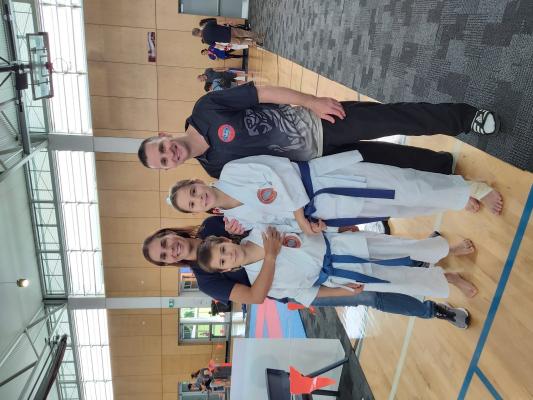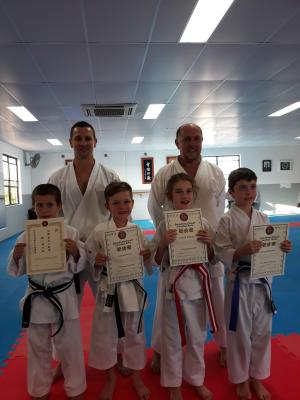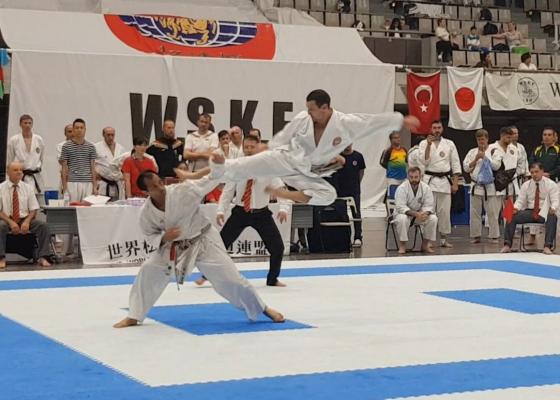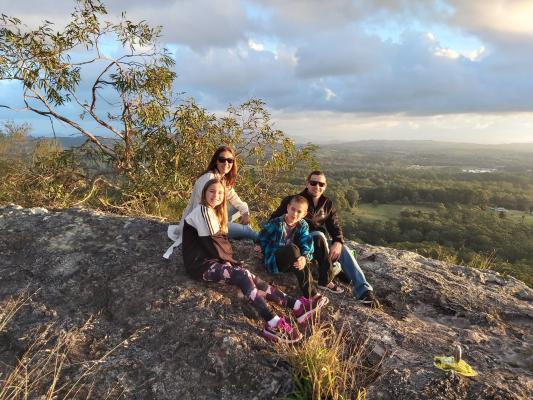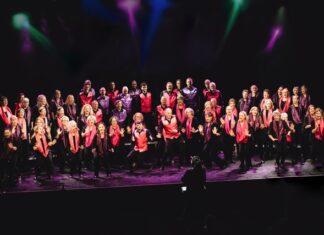Recently, it was on again, the Annual Shotokan Karate Tournament hosted by the Sunshine Coast Martial Arts, Shotokan Karate and Fitness Institute of Noosaville. Now in its fifth year, and despite Covid-19, it was again a success. Under the supervision of Bryan Dukas 6th Dan and Chief instructor of the Noosaville club, the tournament attracted clubs from Brisbane Gympie Noosa and other Sunshine Coast regions.
“Naturally our numbers were slightly down on other years,” said Sensi (teacher) Bryan Dukas, “but considering everything we are very pleased, with some 80 competitors entered. On previous years, our tournament had been held at the Good Shepard Lutheran College, but because of ongoing renovations the Tewantin State School offered their help. For this we are grateful and extend our sincere thanks.”
It was good to see that amongst the competitors, whose ages varied from 5-45, were two young men from Pakistan and a family of two young girls accompanied by their parents: a family that had migrated from Vietnam. This was very gratifying as it shows the high regard in which our local tournament, is held within the region.
For Bryan, born in Vanderbjil Park South Africa in 1978, his involvement with the Noosaville club started in July 2015.During his years in South Africa, Bryan had met a lady, a fellow karate student named Tammy Kelly and when Tammy migrated to Australia and settled in Noosa, they kept in touch : and then in 2015, Bryan received word from Tammy informing him of a dojo in Noosa. As a result of this, in October, he arrived for a holiday and a “bit of a look at this Noosa dojo.”
Bryan liked what he saw and decided Noosa was the place to settle. “I returned to South Africa, resigned in December from my place of work and was back in Noosa by January 2016. After spending time teaching at the dojo with Tammy Kelly, I returned home in April, settled all our family affairs, and with my wife Anita and two sons, Brandon and Mikayla in tow, settled in Noosa by August 2016.Liveing in Noosa was different: however, a few things were similar and this tended to make settling in easy. There was a great community within the dojo, people were helpful and we received plenty of guidance. Over all we would have to say that the hospitality of the Aussies was A1.”
It was at the inquisitive age of five years, that his father Mike took him and introduced him into the world of Shotokan Karate. “I was trained under the Japanese syllabus,” he adds with a smile, “you could say I grew up in a dojo: I lived worked and trained there. My father, who has made Karate his life, now has achieved the very high rank of 9th Dan, Japanese graded. As a result of his lifetime of teaching and dedication, he is respected worldwide, and now because of his attitude, as well as his dedication, many Japanese refer to him as the Western Samurai: I guess you could say, that coming from the Japanese, it is indeed a high mark of respect. He is now also the Vice President of the World Shotokan Karate Federation. It has been not only his teaching, but also his attitude to my learning the importance of the protocols of karate, that have enabled me to achieve my goals.
I have two brothers, Warren and Dylan and Warren, now aged 41, also became dedicated to Karate, obtained his black belt and went on to represent South Africa in international competition. Our mother Marion, like a lot of mothers while not involved physically, became our back bone and kept everything in line; you could say it was a family affair.”
It was in 1993, that travelling to Japan with his father, he underwent two weeks of intensive training, at the end of which he was graded Black Belt. On returning home at 16 years of age, he started teaching as well as competing for South Africa. At the age of 18 he was awarded the trophy as the Best Junior Competitor in South Africa by the National Karate Body. Following this in 2003 he opened his own dojo.
Regard his very first visit to Japan and his introduction to the what lay ahead, came as something of a shock. “My first impression left me in awe: the intensity,disiplin and the protocol, plus the Japanese attitude to training, which was extremely strict, was to say the least, very educational. We stayed in a youth hostel, rose at 6am, exercised, performed our allocated duties, had breakfast then commenced training .This consisted of 3, 2 hr sessions each day. This experience which was to result in his acceptance and belief in the Japanese syllabus, has no doubt been, along with the guidance and teachings of his father, the major factors in his chosen way of life.
While living in South Africa, Bryans National Karate competition in the Kata ( detailed patterns of movements practised either solo or in pairs) and Kumite (sparring)from 1986-2008, saw him winning countless medals (Gold Silver and Bronze) in both individual and team categories : the highlight being in 1996 when he was awarded the Best Competitor in South Africa by the South Africa Karate Federation. His International achievements, in various countries throughout the world, has also been outstanding in both categories; including various World Championships.
The year 2000 in Wales, at the Japan Karate Association World Championships, was a big one for South Africa ;for in this year, they caused a major upset when, for the first time ever the Japanese were beaten for the Gold Medal. “Something which for us seemed unbelievable,” said Bryan.
Perhaps the most personal and proud achievement for Bryan, occurred in 2008, when competing as the South African National Team Captain, in the World Karate Federation World Championships, he contested the Individual Kata in the very same event and hall as his famous father had done in1983. ‘’It gave me such a buzz, and feeling of pride,” said Bryan.
The year 2011, saw Bryan receive the Best Competitor Award at the WSKF World Championships and International Training Seminar in Japan: then in 2013 in Japan awarded his International Instructor, Judge and Examiner Licence. Amongst his major coaching qualifications ( which again are many) is his World Karate Federation Bronze Certified Coach, Australia.
When taking over the Noosaville club as head Sensei, Bryan slowly but surely introduced the syllabus which for his father and himself, has been one of continued success: in this he has been ably supported by Rick Hislop 5th Dan Japanese graded, plus subs .On entering the dojo there is good environment: shoes are removed, the training mats spotless and everything has its place: and noise is kept to the minimum. Classes for the 120 club members, are conducted six days a week with am and pm time slots; with all sessions being properly supervised.
Since his involvement, the club has achieved much in the competition arena with members winning medals at all levels, including state and national. Such has been the standard of coaching, that for four consecutive years 2016-2019, our Noosa club was named Queensland Club of the Year. Also, during this time, a young lady, Danika Starkey junior Black Belt, has achieved results that can only be described as outstanding; winning 5 consecutive Queensland titles and four consecutive Australian titles in Kumite (sparring).
Then in 2018 she was named in the Australian team: winning a bronze medal in the Oceanic Cup (kumite)and a silver in the Pacific Cup (kata). These results were good but the year 2019 would be a year to remember, winning two gold :the first being at the Australian titles, but the best of all, was winning the second at the World (kumite)Championships in Japan. “Her attitude and approach to karate is very determined and positive: she will never give up …simply thrives on hard training,” said sensi Bryan.
“However, it is the overall high standard of the coaching panel that is to be acknowledged,” said Bryan. This was achieved in December 2018, when it was announced that the club had then been accepted, as a club member of the World Karate Federation of Japan: and the official badge was then received by the club. It is a big well done to all involved: in particular wife Anita and the ladies’ group who do so much behind the scenes.
Just prior to this, the leadership and teaching of Bryan Dukas 5th Dan Head Sensi of the club, had been acknowledged during a club visit to Japan: he was elevated to the rank of 6th Dan by the Japanese. They also awarded him his International Referees, Instructors and Examiners Certificates.
To maintain his personal high standard of karate, Bryan trains on- line with sessions organised by World Chief Instructor H Kasuya 9th Dan once a month. “The Covid has restricted our annual visits to Japan, but hopefully we could be travelling there in August 2022.”
To dedicate one’s life not only to teaching the art of karate, but also its ethics, self-discipline, respect for elders and a non- violent way of life, is indeed for Bryan Dukas 6th Dan, a quite achiever, a life well spent. For the Dukas family, this week was a big one: they officially received their Australian citizenship papers. Now, proud to say they are definitely- One of Our Families.

